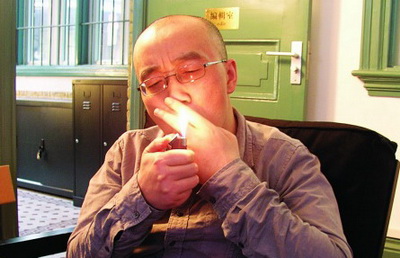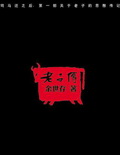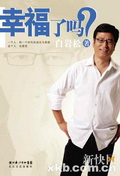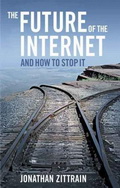


Han Dong: Man is Chance
By Yu Yishuang (于一爽)
[Literature] p. 11
Original Article: [Chinese]
The Metamorphosis of an Educated Youth (知青变形记)
by Han Dong (韩东)
Flower City Publishing House, April 2010
Han Dong (韩东) began writing in the 80s. By the 90s, he had become one of China's best known authors. After his divorce, he shut himself up in his home in Nanjing. It would be seven or eight years before he returned to the literary scene, something he attributes to chance as much as the entreaties of his friends. Now he writes every day from morning until late afternoon, and occasionally browses Douban.
His new novel, published earlier this year, is called Metamorphosis of an Educated Youth (知青变形记) and it tells the story of Luo Xiaofei, an "educated youth," sent to the countryside in 1968 and desperate to return to the city. When the death of a cow and a crude rumor threatens to destroy his life, Luo is saved when chance offers him a new identity.
Han Dong writes poetry, novels, and screen plays. His other works include his Poetry Collection, and his novels Banished (2003), Me and You (2006), and A Small Town Hero Strides Forth (2008).
Also in Literature:
A short feature on 2010 Nobel Laureate in Literature Mario Vargas Llosa
Ou Ge writes about Llosa's stories and his novel Aunt Julia and the Scriptwriter
Hosseini on the works of Israeli author Amos Oz.
 Laozi and Ancient Chinese Thought
Laozi and Ancient Chinese Thought
By Yu Shucun (余世存) and Hu Jiujiu (胡赳赳)
[Focus] p. 16
Original Article: [Chinese]
The Life of Laozi (老子传)
by Yu Shucun (余世存)
Hainan Publishing House, October 2010
Laozi and Sun Zi are China's best known ancient thinkers. Sun Zi was a theorist about people, Laozi dealt with being. Although Greek and Roman civilizations left behind countless records, Chinese dynasties have not, and author Yu Shucun hopes his book will be a small step in that direction.
Yu came to the project through studying the I Ching and Tao te Ching (also known as the Dao De Jing). He wants to speak to the Chinese public through Laozi, and hopes that in their difficult and frantic lives, they will find in the philosophy and life of Laozi some comfort and peace of mind.
In writing about Lao Zi, Shucun did not have records to work with, but he is certain that we can see the life of Laozi in the Tao te Ching. Laozi read books, loved women, and lived in the world, even if the events of his life have not been documented. Yu is not interested in reciting facts, he is interested in the world Laozi lived in, and the person he was.
The ancient way of thinking contrasts sharply with the modern. Yu writes that we look to the ancients to understand ourselves, and Laozi is still relevant. We cannot live our lives for the future, for material wealth, letting our happiness rise and fall with the vagaries of the property market. We have to ask ourselves, without all these things, without assets and investments, what can we still do? How can we still make life meaningful? If we can do that, we will take a step toward understanding what life is, and who we are.
 An Interview with Bai Yansong
An Interview with Bai Yansong
by Zhang Bangsong (张邦东)
[Dialogue] p. 23
Original Article: [Chinese]
Are You Happy? (幸福了吗?)
by Bai Yansong (白岩松)
Changjiang Literature & Art Press, September 2010
Excerpts from the Interview:
On Happiness:
"There isn't a definitive answer to the question to what happiness is. I like to use a comparison, happiness is like shoes, if the shoe is comfortable, only the wearer knows. You can't measure collective happiness. I think this is a problem with modern society, that we measure everything in terms of the collective, even happiness, asking individuals to strive for a group idea of happiness."
"A person's idea of happiness is inseparable from the time period he lives in."
"But I should clarify, it's not actually the times we live in that make us unhappier. Rather, we live in a time where personal happiness has become very important."
"What we call faith is not just something you suspect to be true, but something you have to repeat to yourself, something you will yourself to belief. When you really believe, you will feel more stable."
On Journalism:
"We shouldn't talk so much about public opinion ... public opinion is invented by the news. If we focus on it too much, it is only to the advantage of the few; if we leave it alone, it does not even exist."
"One day, I will have to say goodbye, maybe because of age, maybe because of something else. But I think I will be ready, I will turn off the switch. I won't pay attention to the news the way I do now, I will focus on caring for my life, for my body."
The Future of the Internet: The Battle over Freedom and Control
by Li Nuo (李诺)
[Academic:] p. 28
Original Article: [Chinese]
 The Future of the Internet and How to Stop It
The Future of the Internet and How to Stop It
by Jonathan Zittrain
Yale University Press, April 2008
The Innovator\'s Dilemma
by Clayton Christensen
Harvard Business School Press, June 1997
The contents of Zittrain's book are available online via Yale University Press
As the title of the Jonathan Zittrain's book suggests, the internet is entering a critical phase. A professor of internet law at Harvard Law School, Jonathan Zittrain addresses his concerns and suggestions about the increasing control exercised over the internet. Zittrain calls the productive capacity of the internet a "generative network," that "fosters innovation and disruption."
Freedom, openness, and public accessibility are the defining attributes a generative network. He is afraid increasing control over the internet will change this.
Christiansen has a different view. For him, the struggle over control and freedom has been a defining part of the development of the internet. In his landmark book, The Innovator's Dilemma, he pointed out how the current state of corporate management kills innovation. And new innovations from outside the corporate world can destroy well-run, profitable businesses in the span of a year.
Both authors pinpoint the defining struggle between innovation and regulation in the development of the internet. Without finding a way to balance the creative capacities of the internet with concerns about safety, legality, and business interests, then a free, open internet will become a thing of the past.
Also in Academic:
Feng Xiangqian on the works of Leo Strauss
Zhang Peihong discusses Essays on the U.S. Supreme Court
Yun Yetui looks at books on Vermeer and the Dutch Golden age of painting
Yi Minzhi on the works and impact of Austrian economist and thinker Ludwig von Mises
Links and Sources
EO's Book Review: Official Site
Douban: EO\'s Book Review
Sina ishare.iask: PDF of November Issue
Economic Observer: October Issue of EO\'s Book Review
Economic Observer: September Issue of EO\'s Book Review

